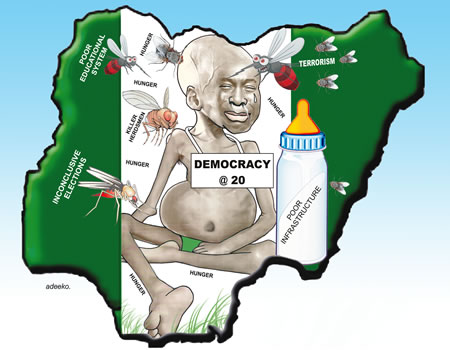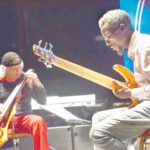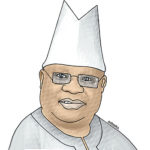PRECISELY 20 years ago, Nigerians heaved a deep sigh of relief. After a prolonged struggle against military dictatorship, civil rule returned to the most populous black nation. It was a bitter struggle because what began as passive resistance soon turned bloody, when the military rolled out their tanks against hapless members of the civil class agitating for civil rule based on the annulled June 12, 1993 presidential election, won by late business mogul, late Chief MKO Abiola.
Many people lost their lives, others were maimed, while quite a number of those that led the struggle were killed, arrested and incarcerated without trial, just others were arraigned, sentenced to death or jailed for life over frame-up charges. As the military oligarchy flung its fangs menacingly, some arrowheads of the struggle bolted away through deadly paths into self-exile. The once booming business concerns of the agitators, including those that continued to dare the lion in its den, became targets of agents of the Establishment and military autocracy. The establishment deployed crude forces in its desperate bid to crush popular protest on the streets of mainly, Lagos, Abuja, Ibadan and other parts of the South-West geopolitical zone, which became a war zone.
FG’s radio station for herdsmen is illegal, unconstitutional —Falana, Rotimi-Williams, Ubani, others
Fate later played a cruel role against the fistic top military echelon, whose nefarious activities had turned Nigeria to a pariah state that must be avoided like a plague by the rest of the world. Though a preponderance of the populace, especially the arrowheads of the democratic struggle were skeptical about the subsequent change of guard at the corridors of power, a consensus soon emerge that culminated in the conduct of the 1999 general election that produced President Olusegun Obasanjo and 36 state governors to birth the Fourth Republic. After the maximum two terms of four years each in office, Obasanjo handed over the baton of leadership to the late President Umaru Yar’Adua, whose tenure was short-circuited by death to pave way for his deputy, Dr Goodluck Jonathan, who was succeeded in office by incumbent President Muhammadu Buhari, on May 29, 2015.
Two decades after the restoration of civil rule, Nigerians can index the tenure of each of the leaders. Twenty years down the line, Nigerians can tell what constitutes the gains, losses and challenges that benchmark the individual tenures of their leaders in the Presidential Villa in such critical sectors as the economy, infrastructure, agriculture; power; conduct of elections; rule of law, good governance, especially transparency and accountability. Has democracy been more of a blessing than challenges; has it been a story of no gain no pain, or a sweet bitter experience that Nigerians have come to fully embrace and live with? Has there been any paradigm shift since May 2015, hence the need for genuine consolidation in the next political dispensation?
Be that as it may, as President Buhari and governors prepare to take their oath of office on Wednesday this week, public expectations remain high. The critical mass of the population are looking forward to policies that can frontally tackle the hydra-headed problem of unemployment, which by the close of 2018 rose by 3.3 million to 20.9 million. In its report, the National Bureau of Statistics (NBS) stated that unemployed and under-employed female population far outpaced that of the men folk. According to the report, “Of the 9.7 million unemployed that did absolutely nothing as at Q3 2018, 90.1 percent of them or 8.77 million were reported to be unemployed and doing nothing because they were first time job seekers and have never worked before. GDP growth to sustain upward trajectory into Q4’18, Q1’19 “On the other hand, 0.9 percent of the 9.7 million that were unemployed and doing nothing at all reported they were unemployed and did nothing at all because they were previously employed but lost their jobs at some point in the past which is why they were unemployed.”
There is also the issue of food security, which chairman, Senate Committee on Media and Public Affairs, Senator Aliyu Abdullahi, who recently lamented that more than 3.7 million people in 16 out of the 36 states and Federal Capital Territory (FCT) were battling with food insecurity. Abdullahi, who was a participant at the Second Conference of the “Feed the future Nigeria agricultural policy project organised by International Food Policy Research Institute (IFPRI), held in Abuja, blamed the problem on the fallout of civic conflicts, climate change, and large scale of displacement, high food prices, poverty and high population among other factors.
He advocated realistic measure to address the menace because Nigeria is ranked 84th out of 119 countries on the global hunger index, with the country coming just below the Republic of Congo. “Food security and nutrition must be tagged urgent because people, population and environmental dynamics will continue to make it so. It must be continuous because survival is a continuous issue and so long as humanity exist the subject remains stuck with us,’’ he said.
A related problem that is ravaging the country is poverty, as an estimated 90.8 million Nigerians are said to be living in extreme poverty as at 2018. This in spite of the huge public expenditure on multifaceted social investment schemes by the Federal Government. By the figure, Nigeria displaced India as the nation with the highest number of people living in extreme poverty across the world, with an estimated 86.9 million people believed to be living on less than $1.25 (N381.25) a day.






